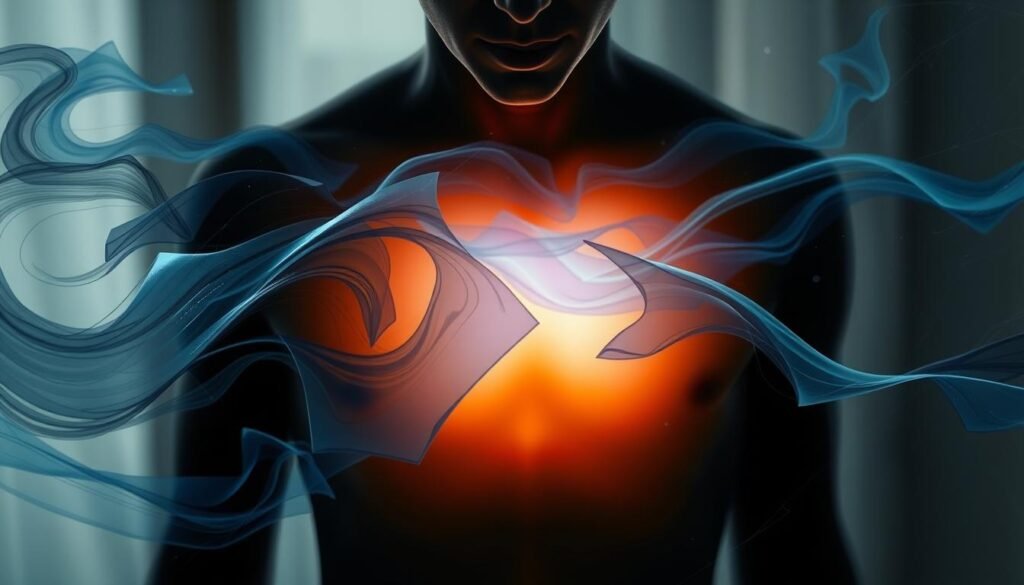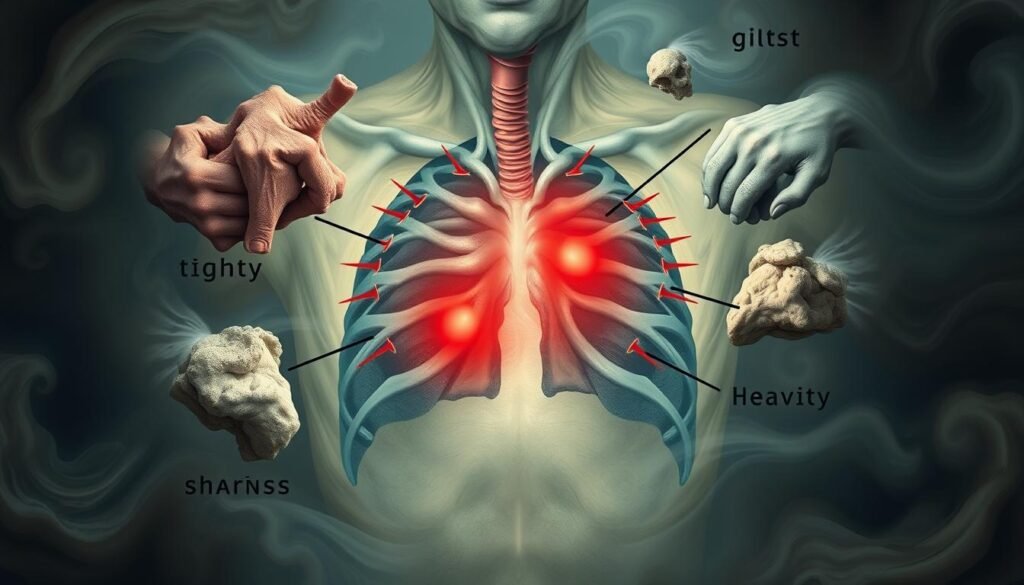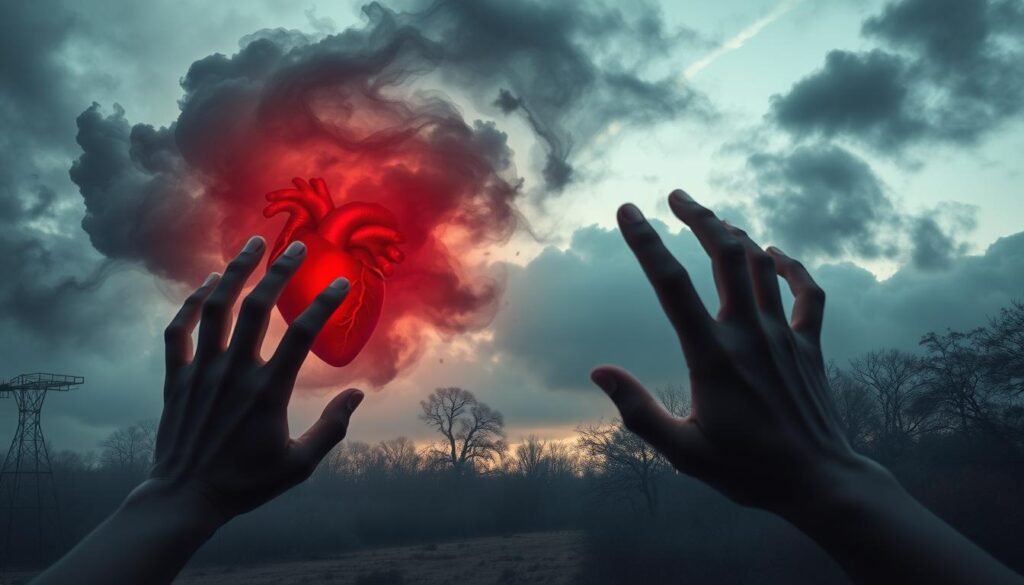Did you know that around 40 million Americans suffer from an anxiety disorder? And a common symptom of this is chest pain. This large number shows how closely anxiety disorders are linked to physical symptoms, especially chest pain. It’s essential to understand how anxiety shows up in our body. This is because many people often think their anxiety-induced chest pain is a sign of heart issues. Knowing the difference is important to prevent worry and confusion. In this piece, we’ll look into how anxiety can cause ongoing chest pain, what happens in our body to cause this, and why it’s key to know the difference between anxiety and heart-related symptoms.
Key Takeaways
- Anxiety disorders affect around 40 million Americans, making chest pain a common symptom.
- Chest pain related to anxiety usually lasts about 10 minutes and occurs during panic attacks.
- Recognizing the difference between anxiety chest pain and cardiac issues is vital for health and safety.
- Managing anxiety effectively can reduce the likelihood of experiencing painful symptoms.
- Understanding the physiological mechanisms can shed light on the mind-body connection in stress-related chest pain.
Understanding Anxiety and Its Symptoms
Anxiety is our natural response to what scares us. It touches many in different ways. There are various types of anxiety disorders, such as generalized anxiety disorder, panic disorder, and social anxiety disorder. It’s crucial to know the symptoms of anxiety to handle them well. This is especially true when anxiety symptoms start affecting your health and happiness.
Defining Anxiety
Anxiety brings strong feelings of worry, fear, and nervousness. These emotions can pop up suddenly or linger, keeping you always on edge. People with anxiety might feel their heart race, sweat more, or have tense muscles. Studies show anxiety is a big reason why 30% to 40% of people rush to emergency rooms for chest pain that’s not serious. It’s important to recognize and act on these feelings for better coping methods.
Common Symptoms of Anxiety Disorders
There are many ways anxiety shows itself. Some common symptoms of anxiety disorders include:
- Restlessness
- Fatigue
- Difficulty concentrating
- Irritability
- Muscle tension
- Sleep issues
Anxiety can also cause physical signs like a fast heartbeat, sweating, tightness in the chest, and breathing hard. These signs often lead to chest pain, raising more health worries. Knowing these symptoms of anxiety helps tell apart anxiety from serious heart problems. In many situations, treatments such as cognitive behavioral therapy and relaxation exercises can greatly reduce anxiety. Looking into resources like the common symptoms of high functioning anxiety can also provide more help.
How Anxiety Can Lead to Persistent Chest Pain
Anxiety can show up as different physical signs, including chest pain. This pain is linked to how our body deals with stress. When we feel anxious, our brain releases hormones like adrenaline. These hormones cause changes in our body. Knowing how this works helps us understand why anxiety can cause ongoing chest discomfort.
The Science Behind Anxiety-Induced Chest Pain
Stress hormones increase our heart rate and blood pressure. This can look like symptoms of a heart attack, which is called stress cardiomyopathy. The National Institutes of Health reports anxiety as a top cause of chest pain. This affects about 40 million Americans. During panic attacks, chest pain is a common symptom. This pain can last a few minutes to several hours, but it usually lasts about 10 minutes.
Links to Panic Attacks
Panic attacks make anxiety’s effects on the body worse, causing intense chest pain. Studies show many people with panic attacks feel chest pain. This pain can feel sharp or like an ache. It’s hard to tell apart from heart problems sometimes. Heart attacks and anxiety chest pain are different, especially in the pain felt and what causes it. If chest pain comes with hard breathing or other bad signs, it might be something more serious. Getting medical help fast is important.
The Physiology of Stress-Related Chest Pain
Understanding stress-related chest pain begins with knowing how our bodies react to danger. This reaction is called the fight or flight response. It’s a basic survival instinct that gets us ready to face or run from threats. When we’re really stressed, our body goes through changes that can cause chest discomfort and pain.
Fight or Flight Response Explained
This response makes your heart beat faster and your blood pressure go up. Your muscles also get tight. These changes prep your body for action. When this happens, you might feel chest pain linked to stress. Knowing how stress and the fight or flight response relate helps explain why some people often feel this pain and go to the doctor.
The Role of Adrenaline and Cortisol
Stress triggers the release of adrenaline and cortisol. Adrenaline quickly gets your heart and muscles ready, while cortisol handles metabolism and the immune response. With constant stress, these hormone levels stay high, causing chest pain. This shows the detailed physiology of stress, where always being “on alert” can be bad for your heart. For frequent chest pain, learning to manage stress and getting therapy help a lot. Addressing the root cause, anxiety, is key.
About 28% of people who go to the hospital for chest pain, but don’t have heart disease, are found to have panic attacks. It’s crucial to know how to handle anxiety.
Treatments like cognitive-behavioral therapy (CBT) can regulate hormone levels and ease symptoms.
Differentiating Between Anxiety and Cardiac Chest Pain
It’s key to know the differences between anxiety and cardiac chest pain for anyone feeling chest discomfort. Both can cause worry and urgency. Recognizing the unique signs of each is crucial.
Characteristics of Anxiety Chest Pain
Chest pain from anxiety has distinct traits. It helps tell it apart from heart pain. Anxiety chest pain is usually:
- Localized to a specific chest area.
- Sharp or stabbing, lasting a short time.
- Linked to panic attacks that start suddenly.
- Not spreading to other body parts.
Though it may seem less serious, anxiety chest pain can be intense at the moment.
Cardiac Symptoms to Watch For
Cardiac symptoms, however, appear differently and need quick action. Signs of heart troubles are:
- Pressure or tightness in the chest, feeling like a heavy load.
- Pain spreading to the arms, jaw, or back.
- Worsening with physical effort.
- Feeling sick, dizzy, and excessively sweating.
Heart attack symptoms might worsen fast and might bring a sense of dire danger. Knowing these signs is crucial for quick medical help, especially if it’s a first-time experience.

| Symptom Type | Characteristics of Anxiety Chest Pain | Cardiac Symptoms |
|---|---|---|
| Type of Pain | Sharp or stabbing | Pressure or tightness |
| Radiation | Localized | Radiates to arms, jaw, or back |
| Aggravation | Often improves with relaxation | Intensifies with exertion |
| Associated Symptoms | Can include trembling and nausea during panic | Nausea, sweating, and lightheadedness |
The Impact of Panic Attacks on Chest Pain
Panic attacks bring on real physical symptoms. These include rapid heartbeat, sweating, and fearing the worst is about to happen. Chest pain is a common symptom because of stress.
What Happens During a Panic Attack?
Stress hormones like cortisol and adrenaline get released during a panic attack. This sets off the “fight or flight” response. This may cause chest pain, described as sharp or stabbing.
Chest pain from anxiety stays in the center or left side of the chest. Unlike heart attack pain, it does not spread. You might also feel tingles or burning in your hands.
How Panic Attacks Can Mimic Cardiac Events
Chest pain during a panic attack can seem like a heart problem. This scares many people into seeking medical help they might not need. In fact, 58% of chest pain cases are more about anxiety than the heart.
This type of chest pain goes away quickly, unlike heart attack pain. Heart attack pain can come and go over time.
Relaxation techniques and exercise can help lessen panic attack symptoms. So can cutting down on caffeine. Talking to a mental health expert can provide ways to manage the symptoms. For more on dealing with chest pain during panic attacks, see this resource.
Common Types of Chest Pain Related to Anxiety
Anxiety can cause different types of chest pain. This can be very worrying for many people. Patients often describe their pain as sharp, burning, or aching. With so many ways to feel pain, it’s hard for doctors to tell it apart from heart problems. Knowing about these pains helps with better treatment and checking heart health.
Describing Chest Pain: What Patients Experience
People with anxiety might feel chest pain like you would with heart problems. But it’s really from anxiety. This pain stays in the chest, starts suddenly from stress, and feels tight or heavy. Some also have trouble breathing or feel their heart race.
- Localized pain that typically remains in the chest
- Onset that can be sudden, often linked to anxiety triggers
- A sensation of tightness or pressure in the chest area
- Associated symptoms such as shortness of breath or palpitations
Many who go to the emergency room without heart issues find out anxiety is to blame. This shows how big a role anxiety plays in feeling chest pain.
Factors Influencing Chest Pain Severity
Several things can make anxiety chest pain feel worse:
- Stress levels: More stress makes the pain worse.
- Physical health: Other health problems can add to the pain.
- Tolerance to anxiety: People feel pain differently based on how they handle anxiety.
- Situational triggers: Tough times or changes can make symptoms stronger.
About 30-40% of people who don’t have heart problems actually have anxiety. Treating these factors helps ease the pain and makes life better.

The Mind-Body Connection in Anxiety Disorders
The connection between mental and physical health shows how complex anxiety disorders are. Psychological stress often leads to physical symptoms. This understanding is crucial for treating anxiety effectively. It helps in recognizing the health effects of addressing both mind and body.
Understanding Psychosomatic Symptoms
Anxiety can make the body react with physical symptoms. These symptoms, like chest pain, can confuse patients and doctors. They show how anxiety affects the body, causing discomfort and distress.
Psychosomatic symptoms linked to anxiety include:
- Chest pain or discomfort
- Headaches
- Digestive issues
- Muscle tension
- Fatigue
To treat these symptoms, it’s important to combine psychological and physical health strategies. Medicines like SSRIs and Cognitive Behavioral Therapy (CBT) are helpful. By focusing on both mental and physical health, people can improve their overall life quality.
Psychological Effects of Chronic Anxiety
Chronic anxiety can cause more than just mental stress. It can also harm your physical health over time. Knowing how ongoing anxiety affects us shows both mental and physical risks.
Long-Term Impact on Physical Health
Chronic anxiety can lead to serious health issues, like heart problems. It also increases the risk of anxiety and panic attacks. Studies show that 25 to 50 percent of people with low-risk chest pain also have anxiety.
Chronic anxiety can cause hormonal imbalances. This can lead to chest pain. Some people might feel back pain or fatigue, similar to a heart attack. This shows how complex anxiety’s effects on health can be.
Panic disorders add to these problems, affecting up to 4 in 100 people. Among them, 20% to 70% experience chest pain during panic attacks. This shows the close link between anxiety disorders and physical symptoms, stressing the need for thorough treatment plans.

To reduce the impact of chronic anxiety, it’s important to be proactive. Regular exercise, good sleep, and managing stress are key. These steps can lessen anxiety and its physical effects, like chest pain. By understanding how mental and physical health are connected, we can find better treatments and improve our quality of life.
Coping Strategies for Managing Anxiety and Chest Pain
Anxiety can cause chest pain among other symptoms. It’s important to have ways to deal with it. Learning how to handle stress is key. It helps lower anxiety and can stop chest pain from starting.
Effective Stress Management Techniques
There are many ways to manage stress. Some of the best methods include:
- Cognitive Behavioral Therapy (CBT): This helps change bad thoughts into better ones, easing anxiety.
- Mindfulness Practices: Mindfulness or meditation helps you stay in the moment, which reduces anxiety.
- Physical Activity: Exercise makes your body release endorphins. These make you feel happier and less anxious.
- Progressive Muscle Relaxation: You tighten then relax your muscles with this method. It helps let go of stress.
Relaxation Methods and Their Benefits
Adding relaxation methods into your day can really help if you have anxiety. Some good methods are:
- Guided Imagery: Thinking of peaceful scenes can calm anxiety and help you relax.
- Yoga: Yoga mixes movement, breath work, and meditation to lessen anxiety symptoms.
- Deep Breathing Exercises: Slow breaths can reduce your heart rate and panic feelings.
Using these techniques and relaxation methods helps you not focus on anxiety. Doing them often can make you healthier in mind and body. This brings a calmness that improves your life quality.
The Role of Cognitive-Behavioral Therapy (CBT)
Cognitive-behavioral therapy, known as CBT, is a powerful way to treat anxiety and symptoms like chest pain. This method teaches people how to spot and question their negative thoughts. This can lead to better coping mechanisms and lessen anxiety symptoms. CBT is especially useful for those with anxiety-related chest pain, helping decrease how often and how severe these episodes are.
How CBT Helps in Reducing Chest Pain from Anxiety
Studies show that CBT offers a framework for people to understand the connection between their anxiety and physical feelings like tightness in the chest. It combines thought-based and practical techniques to lower anxiety, which can reduce chest pain. A study noted that 36% of those who did CBT online saw a big drop in their fear of heart problems. This was more effective than traditional teaching methods, which only helped 27% of participants.
CBT aims to give long-lasting skills for managing emotional and physical responses. It swaps out unfounded fears with logical thinking. This change leads to less anxiety and fewer symptoms like chest pain. For folks dealing with non-cardiac chest pain, often linked to anxiety, CBT has shown to improve their quality of life. Recognizing how their body reacts to stress aids people in their journey towards getting better.
To learn more about how anxiety-related chest pain differs from real heart issues, checking out resources like knowing the signs and differences might help.
Conclusion
Understanding how anxiety and chest pain are related is very important. Many times, chest pain isn’t caused by heart problems. Instead, 30% to 50% of these cases are due to anxiety. Knowing this helps people find the right anxiety treatment to feel better.
It’s vital to use good ways to cope with anxiety. Deep breathing and regular exercise help reduce anxiety and chest pain. It’s also important to get enough sleep, between 7-9 hours, for your mental health. Staying away from caffeine and alcohol can help lessen anxiety attacks too.
Adding treatments like Cognitive Behavioral Therapy (CBT) can make life better. It helps deal with anxiety and chest pain together. By focusing on managing anxiety, your overall health can get better. This prevents problems from not treating anxiety. Taking steps to understand chest pain and anxiety can lead to better health outcomes.